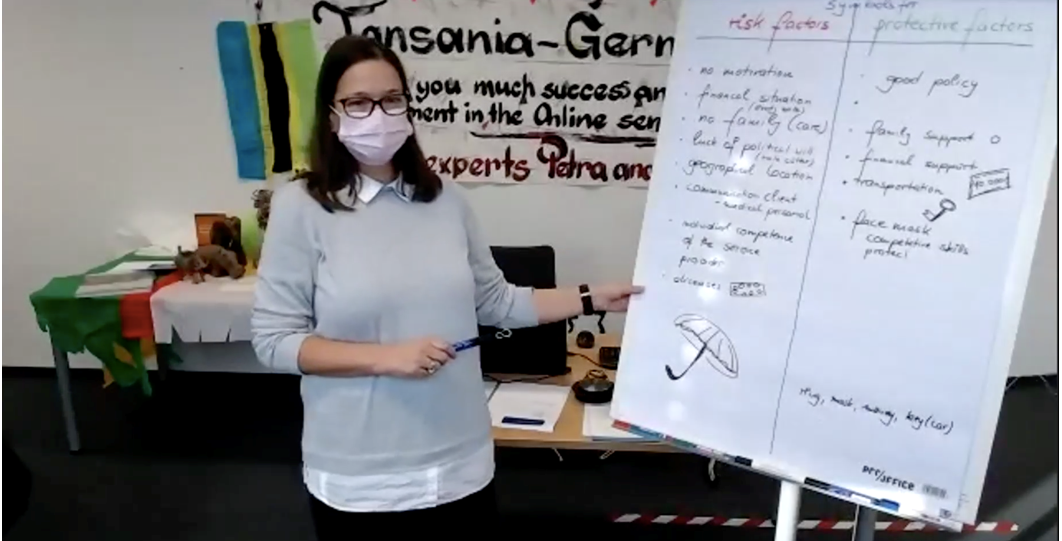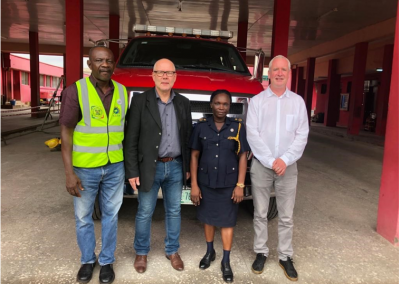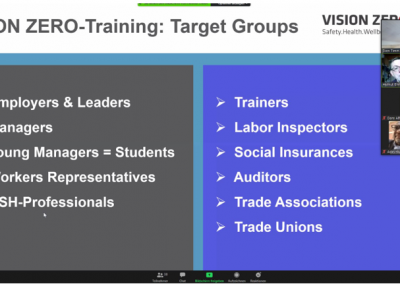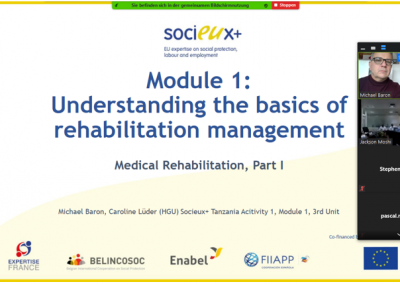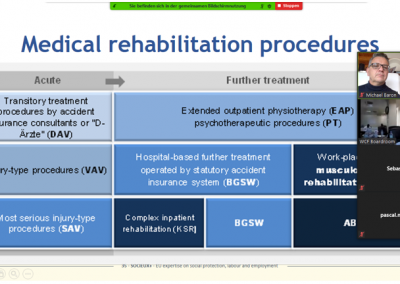Web-based training on rehabilitation management, with the Workers Compensation Fund from Tanzania (WCF) and the expertise of DGUV (SOCIEUX+ 2020-07). Picture courtesy of DGUV.
Health and safety at work: SOCIEUX+ training experiences in Nigeria and Tanzania
Health and safety at work (OSH) is a strategic aspect of social protection that improves job quality, productivity, and the sustainability of social security systems. Within the SOCIEUX+ portfolio of peer-to-peer technical cooperation activities, OSH has become increasingly relevant, with partner institutions emphasizing the prevention of occupational accidents and diseases, including work-related road accidents, and the promotion of EU good practices.
Since 2019, SOCIEUX+ has organized a series of four trainings in Nigeria at the request of the Lagos State Safety Commission (LSSC) and the awareness-raising NGO, Safety Advocacy & Empowerment Foundation (SAEF) (Action 2019-13 NRA). The objective was to strengthen partners’ capacities to promote and support the development of a workplace culture of preventative health and safety. Each training involved around 50 high-level participants from more than 10 Nigerian states, the Ministry of Labour and Employment, national agencies, social partners, NGOs, and private sector representatives.
Several teams of EU experts from the National Health Insurance Fund for Salaried Workers (CNAMTS), German Social Accident Insurance (DGUV), the German Institute for Work and Health (IAG), the German Road Safety Council (DVR), the State Labour Inspectorate of Lithuania, and the energy sector. Altogether, they delivered four sessions over 20 training days. The last two modules, conducted online in late 2020 and 2021, focused on OSH and road safety, respectively, and were based on the Vision Zero philosophy, the International Social Security Association’s (ISSA) flagship initiative on preventing work-related accidents.
In the framework of technical assistance to the Workers Compensation Fund (WCF) of Tanzania, a series of remote online training sessions were conducted from October 2020 to March 2021 (Action 2020-07 TNZ). The aim of these activities was to enhance the capacities of WCF and its partners. Altogether, four activities were conducted with over 20 trainees per module including medical doctors, occupational therapists, case managers, and claims assessment officers from WCF and related facilities all over the country.
An initial module aimed to sensitise participants to the principles of workplace safety and health. Then, a series of progressively more advanced modules on rehabilitation management narrowed the scope of the action on rehabilitation practices, legal frameworks, communications, and case management. This action was a spin-off of a parallel action on defining a rehabilitation strategy for WCF (TNZ 2019-35), which is currently ongoing.
For the WCF activities, a total of eight public experts were mobilised for 31 training days. They came from the German Social Accident Insurance Institution for the administrative sector (VBG), the University of Applied Sciences of DGUV, the University of Applied Sciences Bonn-Rhein-Sieg, Social Accident Insurance Institution for Local Authorities in the Oldenburg region, and DGUV in Germany, the Centre of Occupational Diseases (OCCMED) in the Netherlands, and the International Centre for Rural Health of the University of Milan, Italy.
On both actions, experts from partner institutions developed the training methodology, chose topics, clarified learning expectations, and selected participants. A training of trainers’ approach was consistently adopted by these experts to enhance the ownership and sustainability of results. Both for in-person and remote activities, a highly participatory dynamic was sought through tools including participant presentations, homework, minute taking, and physical exercises. Presentations of EU and international good practices were provided during face-to-face trainings, PowerPoint presentations, distribution of materials, projection of videos and interviews with external physicians and colleagues. Feedback from both actions was overwhelmingly positive towards the quality of the technical trainings, the outreach and logistics.
Both SOCIEUX+ partnerships with LSSC/SAEF in Nigeria and WCF in Tanzania built the capacities of members and external stakeholders through the mobilisation of high-level experts from several EU member states’ public administrations. Through examples of EU good practices, all activities showcased the variety and depth of the European social security model while also promoting knowledge transfer and exchanges according to the peer-to-peer approach. The resulting outcome is the contribution of SOCIEUX+ towards more effective health and safety practices, strengthened rehabilitation management capacities, and awareness raising focused on prevention, in the Tanzanian and Nigerian social security systems.
Giuliana De Rosa
SOCIEUX+ Action Manager
(SOCIEUX+ 2020-07 Tanzania & 2019-13 Nigeria)
Gallery
Image 1
Occupational Safety and Health in Nigeria. On site visit in July 2019, picture courtesy of Safety Advocacy and Empowerment Foundation, Nigeria (SOCIEUX+ 2019-13).
Image 2
Occupational Safety and Health in Nigeria. Web-based training: module on Vision Zero Strategy. Picture courtesy of DGUV (SOCIEUX+ 2019-13).
Image 3
Enhancing rehabilitation capacities with the Workers Compensation Fund From Tanzania (WCF): Web-based training. (SOCIEUX+ 2020-07).







